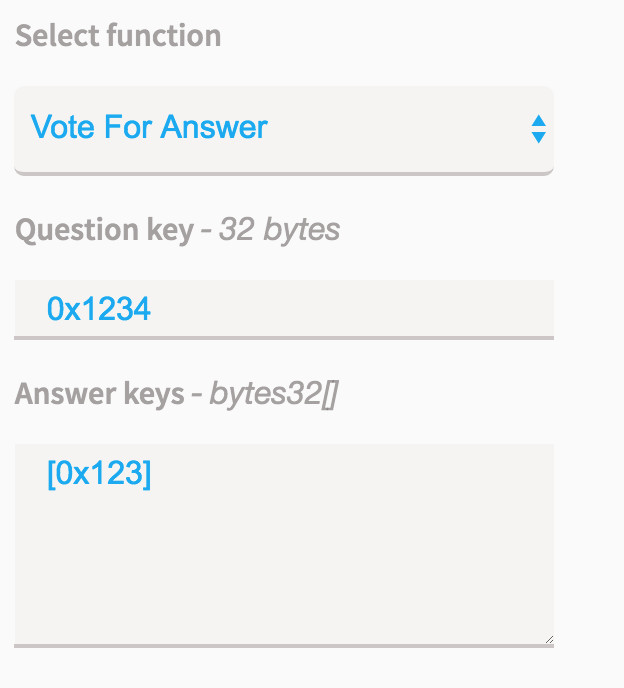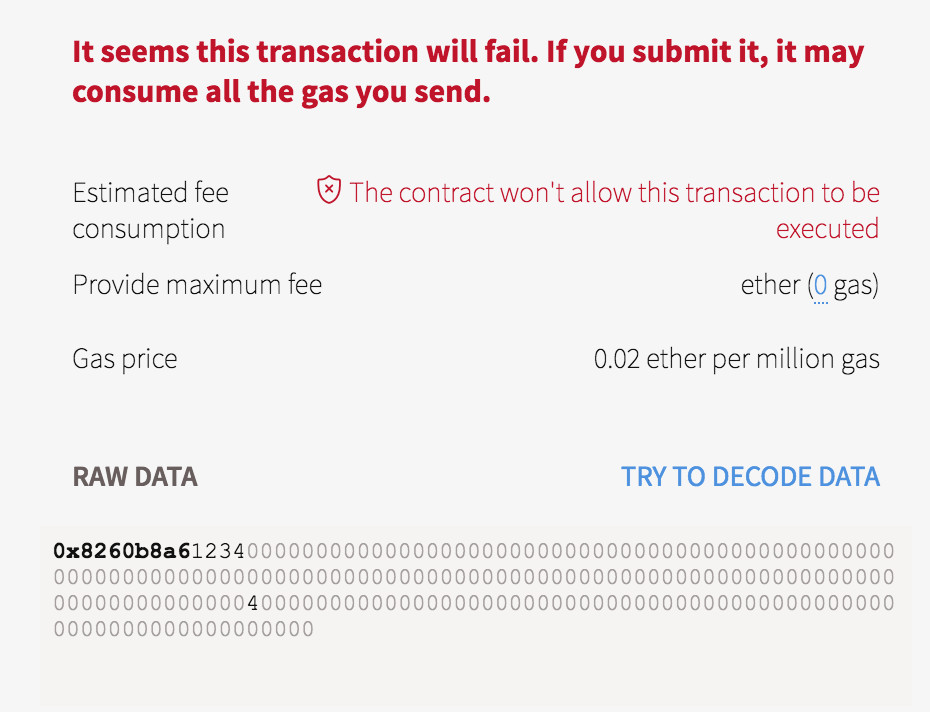i have the following contract function
function voteForAnswer(bytes32 questionKey, bytes32[] answerKeys)
returns (bool success)
{
// is the sender allowed to do this?
if (voters[msg.sender].enabled == false) {
throw;
}
// TODO: check for question existence;
if (questions[questionKey].alreadyVoted[msg.sender] == true) {
throw;
}
questions[questionKey].alreadyVoted[msg.sender] = true;
for (uint i; i <= answerKeys.length; i++) {
questions[questionKey].answers[answerKeys[i]].voteCount += 1;
VoterVotedFor(msg.sender, questionKey, answerKeys[i]);
}
}
How can i invoke the contract function?
currently i get the following Mist-Message
What do i wrong?
Thanks Thomas
UPDATE
i adapted my contract so that i do not use any more an array in my function VoteForAnswer; i still get an error:
pragma solidity ^0.4.0;
contract owned {
address public owner;
function owned() {
owner = msg.sender;
}
modifier onlyOwner {
if (msg.sender != owner) throw;
_;
}
function transferOwnership(address newOwner) onlyOwner {
owner = newOwner;
}
}
contract Roadshow is owned {
bytes32 public text; // shortname (up to 32 bytes)
uint public start; // datetime when roadshow starts
uint public end; // datetime when roadshow ends
mapping(address => Voter) public voters;
struct Voter {
bool enabled; // if true, that person is currently allowed to vote
}
struct Answer
{
bytes32 text;
uint voteCount; // number of accumulated votes
// add more non-key fields as needed
}
struct Question
{
bytes32 text;
mapping(bytes32 => Answer) answers; // random access by question key and answer key
bytes32[] answerList; // list of answer keys so we can look them up
// add more non-key fields as needed
mapping(address => bool) alreadyVoted;
}
mapping(bytes32 => Question) questions; // random access by question key
bytes32[] questionList; // list of question keys so we can enumerate them
function Roadshow(bytes32 _name) {
text = _name;
start = now;
voters[msg.sender].enabled = true;
}
function addQuestion(bytes32 questionKey, bytes32 text)
onlyOwner
returns(bool success)
{
// not checking for duplicates
questions[questionKey].text = text;
questionList.push(questionKey);
return true;
}
function getQuestion(bytes32 questionKey)
public
constant
returns(bytes32 wording, uint answerCount)
{
return(
questions[questionKey].text,
questions[questionKey].answerList.length);
}
function addAnswer(bytes32 questionKey, bytes32 answerKey, bytes32 answerText)
onlyOwner
returns(bool success)
{
questions[questionKey].answerList.push(answerKey);
questions[questionKey].answers[answerKey].text = answerText;
// answer vote will init to 0 without our help
// questionStructs[questionKey].answerStructs[answerKey].voteCount = 0;
return true;
}
function getQuestionAnswer(bytes32 questionKey, bytes32 answerKey)
public
constant
returns(bytes32 answerText, uint answerVoteCount)
{
return(
questions[questionKey].answers[answerKey].text,
questions[questionKey].answers[answerKey].voteCount);
}
function getQuestionAnswerText(bytes32 questionKey, bytes32 answerKey)
public
constant
returns(bytes32 answerText)
{
answerText = questions[questionKey].answers[answerKey].text;
return answerText;
}
function getQuestionAnswerCount(bytes32 questionKey, bytes32 answerKey)
public
constant
returns(uint answerCount)
{
answerCount = questions[questionKey].answers[answerKey].voteCount;
return answerCount;
}
function getQuestionCount()
public
constant
returns(uint questionCount)
{
return questionList.length;
}
function getQuestionAtIndex(uint row)
public
constant
returns(bytes32 questionkey)
{
return questionList[row];
}
function getQuestionAnswerCount(bytes32 questionKey)
public
constant
returns(uint answerCount)
{
return(questions[questionKey].answerList.length);
}
function getQuestionAnswerAtIndex(bytes32 questionKey, uint answerRow)
public
constant
returns(bytes32 answerKey)
{
return(questions[questionKey].answerList[answerRow]);
}
// in Ethereum we cannot pass dynamically sized arrays
// function voteForAnswer(bytes32 questionKey, bytes32[] answerKeys)
function voteForAnswer(bytes32 questionKey, bytes32 answerKey)
returns (bool success)
{
// is the sender allowed to do this?
if (voters[msg.sender].enabled == false) {
throw;
}
// TODO: check for question existence;
if (questions[questionKey].alreadyVoted[msg.sender] == true) {
throw;
}
questions[questionKey].alreadyVoted[msg.sender] = true;
questions[questionKey].answers[answerKey].voteCount += 1;
VoterVotedFor(msg.sender, questionKey, answerKey);
return true;
}
function addVoter(address _voter)
onlyOwner
returns (bool success)
{
voters[_voter] = Voter(true);
VoterAdded(_voter, this.text());
return true;
}
event VoterAdded(address _newVoter, bytes32 _questionKey);
event VoterVotedFor(address _voter, bytes32 _questionKey, bytes32 _answerKey);
}


